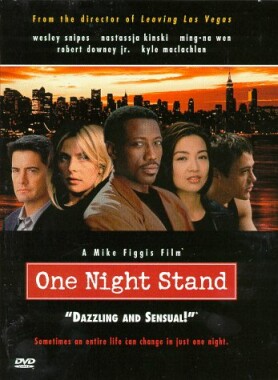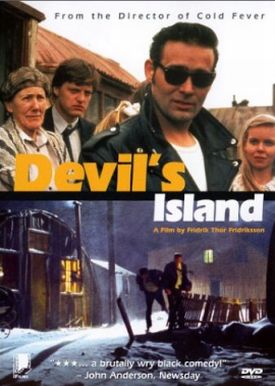Albino Alligator
It was an interesting experience to go to see Kevin Spacey’s Albino Alligator with Jackie Chan’s First Strike fresh in my mind. The two films stand at opposite poles: the one delightfully fresh and uncomplicated and entirely based on its swift, non-stop movement and the other slow and lugubrious and full of portentous dialogue and deep meanings. I suppose it is approximately what we should expect from the man who played such shocking but central roles in Seven and The Usual Suspects, but give me Jackie Chan every time
The story begins with scenes of some ATF agents watching an apartment in New Orleans in the dead of night intercut with others involving an inept bunch of burglars setting off an alarm in a factory they have broken into and high-tailing it in a stolen car. Someone comes out of the apartment, but notices that he is being watched and gets into a different car, one whose make the agents can’t quite see. They radio to another agent who is working undercover as a city employee in a manhole (in the middle of the night? some cover!). He watches the suspicious car go by and radios back that he’s seen it and the agents are on their way in pursuit. Then, with nothing better to do, the manhole chap, looking for a light, sees a book of matches in the middle of the street. He crawls out of his manhole to go get it and the second criminal car, the one containing the three burglars roars around the corner and runs him down. They’re going so fast they don’t even know they’ve hit anything.
When the ATF agents pass by a minute later they see their dead comrade in the street, radio for an ambulance and tear off in pursuit, now, of the car that hit him. But they don’t know it’s not the same car they were chasing to begin with. As they come up behind it, the driver, who is called “Law” (William Fichtner)—all the characters naturally have strange and vaguely significant names—slams on the brakes. There are two weird things about the ensuing accident. The first is that the ATF guys are not wearing seat belts, nor is their car equipped with air bags. They are both catapulted through the windshield and killed. The second weird thing is that neither Law nor Dova (Matt Dillon), who are sitting in the front seat of the stolen car is scratched, but the third burglar, Milo (Gary Sinise), who had been sitting in the back seat, is badly injured in the face. What did he hit with it that the two guys in front would not have hit first?
Anyway, Law and Dova abandon the wreck and carry Milo over their shoulders to a little hole in the wall bar that is just closing. It’s called (wait for it) Dino’s Last Chance. It is at this point that, if you’re sensible, you will realize that you have paid your dues as an intellectual for the day and go home.
Here are the people in the bar. Dino (M. Emmet Walsh), who owns it, Janet (Faye Dunaway), the barmaid, a barfly called Jack (John Spencer) a strange foreigner who dresses too well and says too little called and is called Guy (Viggo Mortensen) and a kid hanging around the pool tables called Danny (Skeet Ulrich). These people are about to be taken hostage as the bar, which used to be a speakeasy and has no back entrance, is soon surrounded by ATF agents, led by G.D. Browning (Joe Mantegna). The character of Browning is a total cliché of the harried cop directing a “hostage situation” and an embarrassment, but luckily we do not get to see too much of him. The film achieves what little effects it can by letting out in dribs and drabs such important and exciting secrets as that Danny is Janet’s son. The most important secret of all is that the strange foreigner, Guy, is the guy (pronounced gee) the ATF had under surveillance in the first place and now the one they think they have holed up in the bar. And they do have him holed up in the bar! But it’s only by accident.
Now here comes the weirdest part of all. While the three bad guys (Milo is now conscious again) are debating what to do, Guy comes up with a brilliant idea. Since the cops didn’t see them come in and don’t know who they are, why don’t they make a list of demands and say that they will free one hostage for each demand that is met. Then, sly dogs that they are, they will free themselves in the place of hostages, leaving the hostages tied up inside.
And it is a brilliant idea too. But it doesn’t make any sense coming from Guy, who knows that it is he whom the cops are after. When they finally come in and find him, even if the others in the bar back up his story that it was the supposed hostages who did it and not he, he’s still going to be arrested, and it will be assumed by one and all that he was in on it from the beginning anyway. The burglar-kidnappers recognize the brilliance of the plan—at least Milo, the smart one, does—but then they haven’t got wit enough to see that the presence of Guy, who is the one the cops think they’re after, makes it even easier for them. Instead, when they find out that the boys in blue outside think it’s Guy they’re after, they first accuse him of being a cop (huh?) and then beat him to within an inch of his life.
These guys are just terminally dumb.
Feuding between Milo and Law makes no sense in terms of the plot, however plausible it may be psychologically. And Milo’s suicide, when Dova (who turns out to be his brother) holds a gun on him to prevent him from giving up, makes no sense in either sense. Everything leads up to the moment at which Dova forces Janet to kill Jack if she wants to stay alive herself, and then then the ATF breaks in. In the melée which follows both Guy and Law are killed. As Milo, Jack and Dino are already dead, that only leaves the mother and son, Janet and Danny, and Dova, who are escorted out as if all three were hostages.
A TV reporter asks Dova: “How does it feel to be a hero?”
Ever slow on the uptake, Dova says, “What?”
Suddenly Danny pipes up. “He’s not a hero.”
The TV lady turns to him and demands to know what he means. But before he can decide what to say, Janet speaks up. Now complicit in Dova’s dark deeds she says: “I think he means that none of us are.”
I’ll bet that that particular cliché has never been given such a weight of meaning before!
The albino alligator of the title, by the way, is the sacrifice that a [herd? gaggle? flock? school?]
of alligators will make in order to seize territory from another bunch. When the other bunch all set upon the poor “albo gator” , the first herd take the opportunity to surround and fall upon them and take their territory away from them. The question is, who’s going to be the albo gator here? But as it turns out there isn’t one, so the whole idea seems pretty useless, even apart from sounding wildly improbable as a description of alligator behavior.
Discover more from James Bowman
Subscribe to get the latest posts to your email.








